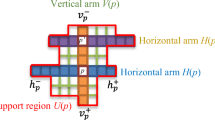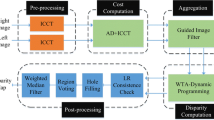Abstract
We propose a scanline energy minimization algorithm for stereo vision. The proposed algorithm differs from conventional energy minimization techniques in that it focuses on the relationship between local match cost solution and the energy minimization solution. The local solution is transformed into energy minimization solution through the optimization of the disparity discontinuity. In this paper, disparity discontinuities are targeted during the energy minimization instead of the disparities themselves. By eliminating and relocating the disparity discontinuities, the energy can be minimized in iterations of O(n) where n is the number of pixels. Although dynamic programming has been adequate for both speed and performance in the scan-line stereo, the proposed algorithm was shown to have better performance with comparable speed.
Preview
Unable to display preview. Download preview PDF.
Similar content being viewed by others
References
Birchfield, S., Tomasi, C.: A pixel dissimilarity measure that is insensitive to image sampling. IEEE Trans. Pattern Analysis and Machine Intelligence 20 (1998)
Bobick, A.F., Intille, S.S.: Large occlusion stereo. IJCV 33 (1999)
Boykov, Y., Veksler, O., Zabih, R.: Fast approximate energy minimization via graph cuts. In: ICCV (1999)
Criminisi, A., Shotton, J., et al.: Efficient dense-stereo and novel-view synthesis for gaze manipulation in one-to-one teleconferencing. Microsoft Technical Report (2003)
Felzenszwalb, P.F., Huttenlocher, D.P.: Efficient belief propagation for early vision. In: IEEE Conf. on CVPR (2004)
Geiger, D., Ladendorf, B., Yuille, A.: Occlusions and binocular stereo. In: Proc. European Conf. Computer Vision (1992)
Gong, M., Yang, Y.H.: Near real-time reliable stereo matching using programmable graphics hardware. In: CVPR (2005)
Hirschmueller, H.: Accurate and efficient stereo processing by semi-global matching and mutual information. In: CVPR (2005)
Ishikawa, H., Geiger, D.: Occlusions, discontinuities, and epipolar lines in stereo. In: European Conference on Computer Vision (1998)
Kim, C., Lee, K.M., Choi, B.T., Lee, S.U.: A dense stereo matching using two-pass dynamic programming with generalized ground control points. In: CVPR (2005)
Scharstein, D., Szeliski, R.: A taxonomy and evaluation of dense two-frame stereo correspondence algorithms. IJCV (2002)
Sun, J., Zheng, N.-N., Shum, H.-Y.: Stereo matching using belief propagation. IEEE Trans. PAMI 25 (2003)
Veksler, O.: Stereo correspondence by dynamic programming on a tree. In: CVPR (2005)
Author information
Authors and Affiliations
Editor information
Editors and Affiliations
Rights and permissions
Copyright information
© 2006 Springer-Verlag Berlin Heidelberg
About this paper
Cite this paper
Jung, H.Y., Lee, K.M., Lee, S.U. (2006). Stereo Matching Using Scanline Disparity Discontinuity Optimization. In: Blanc-Talon, J., Philips, W., Popescu, D., Scheunders, P. (eds) Advanced Concepts for Intelligent Vision Systems. ACIVS 2006. Lecture Notes in Computer Science, vol 4179. Springer, Berlin, Heidelberg. https://doi.org/10.1007/11864349_54
Download citation
DOI: https://doi.org/10.1007/11864349_54
Publisher Name: Springer, Berlin, Heidelberg
Print ISBN: 978-3-540-44630-9
Online ISBN: 978-3-540-44632-3
eBook Packages: Computer ScienceComputer Science (R0)




